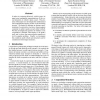Free Online Productivity Tools
i2Speak
i2Symbol
i2OCR
iTex2Img
iWeb2Print
iWeb2Shot
i2Type
iPdf2Split
iPdf2Merge
i2Bopomofo
i2Arabic
i2Style
i2Image
i2PDF
iLatex2Rtf
Sci2ools
138
click to vote
IJCAI
1997
1997
Cooperation Structures
In order to cooperate effectively with its peers, an agent must manipulate representations of the social structures in which it plays a part. The purpose of this paper is to investigate the mathematical and computational aspects of this social reasoning process. We begin by defining an abstract representation of cooperation structures, wherein agents cooperate to achieve goals on each other’s behalf. We then investigate the question of whether or not cooperation is feasible with respect to an agent’s goal, and we show that answering this question is an NP-complete problem. Finally, we investigate the conditions under which such structures can be composed to form larger structures.
Related Content
| Added | 01 Nov 2010 |
| Updated | 01 Nov 2010 |
| Type | Conference |
| Year | 1997 |
| Where | IJCAI |
| Authors | Mark d'Inverno, Michael Luck, Michael Wooldridge |
Comments (0)

